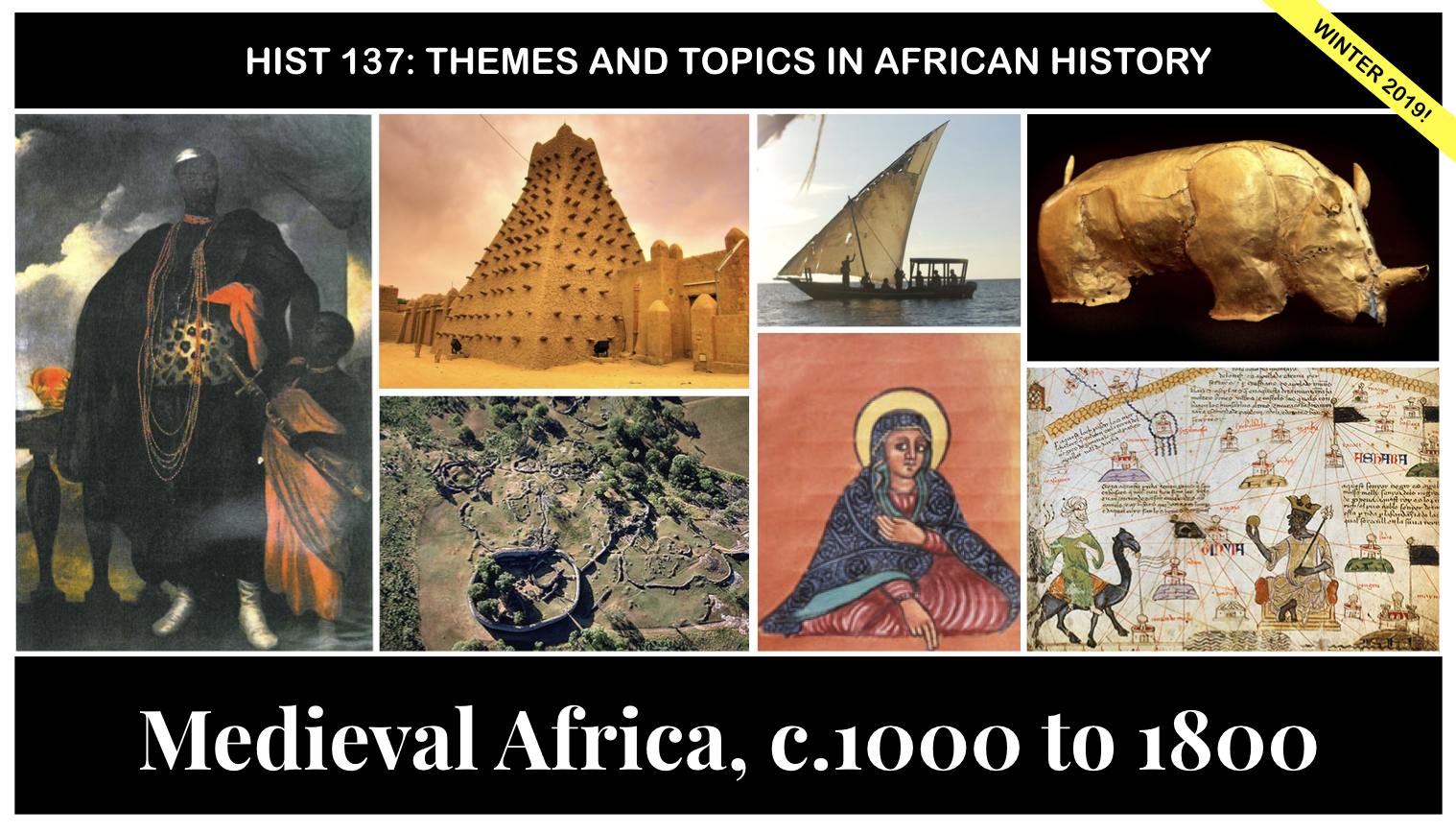Teaching Philosophy
One of the most exciting aspects of teaching Africa is the opportunity for students to question the production of historical knowledge, archives and discourses about the past. As a historian, I encourage students to approach the challenge of limited archival sources for Africa as rather opportunity to develop critically innovative methodologies, and to learn about approaches historians have taken in the past when confronted with these limitations. Rather than treat history as a fixed body of knowledge that one can “master,” I encourage students to consider multiple possible vantage points and interpretations, and to focus instead on developing their own analytical and critical thinking skills.
COURSES
UNDERGRADUATE SURVEY. History of ‘Medieval’ Africa circa 1000 C.E. to 1800 C.E.
This course is an introductory survey of African history from the eleventh to the nineteenth century. One of the goals is introduce students to the major themes and debates in different geographical regions of Africa over time, and to examine these regions’ relations with other parts of Africa and other parts of the world, specifically African Diasporas in Europe, Asia, and the Americas. Another main goal of the course is to examine the different ways in which historians have approached sources on Africa’s past and the ways in which African history can be understood. These help to define and identify, in time and space, the varied patterns and forms of historical development and change that occurred in the different regions of the continent. Students will be encouraged to compare and contrast the diverse ways African peoples built and developed their societies over the centuries during the period between the ancient past and contemporary times.
LINK TO SYLLABUS
GRADUATE SEMINAR. HIST 218 Africa in the Era of the Transatlantic Slave Trade.
Slavery and slave trade are topical issues and momentous developments in the histories of Africa and the Americas. But both slavery and slave trade were worldwide phenomena that date back to the classical age, although slave systems differ in time and space. This course begins with the question of terminological precision and the definition of slavery and other forms of servile labor –especially in Africa. The course then examines recent historiographical approaches to the institution of slavery in Africa and the Americas within this wider historical context, analyzing the political economies and ideologies that underpinned slavery and the crucial role of slave trade(s) in reproducing slave communities that were barely able to reproduce themselves naturally. The course seeks to discern the voices of those enmeshed in the nexus of enslavement through the life histories, diaries, and biographies of slaves, ex-slaves, slave traders, abolitionists, and others. The course explores the impact of slavery on political, economic, social, and cultural life in Africa and the Americas, and ends with a discussion of memory and the representation of the past, slave roots tourism, and the African American re-engagement of Africa.
LINK TO SYLLABUS
Undergraduate Seminar. HIST 140 Africa and the French Atlantic 1650-1848.
Slightly over half of the world’s over 200 million French speakers today live on the African continent—a contemporary reflection of centuries of history. This seminar introduces students to historical debates about French Atlantic expansion from the 17th century through the final French abolition of slavery in 1848 with a special focus on Africa. We will draw distinctions between French and other European (especially British) imperial trajectories which were informed in part by the relative importance and success of their respective navies and the nature of the slave-based economies in the Americas over time. We will also consider the impact of the French Revolution, the Haitian Revolution, the Napoleonic wars and the debate over abolition in France, the Americas and in parts of Africa such as Senegal, Ouidah (Dahomey), Congo, Madagascar and Mauritius.
LINK TO SYLLABUS
Undergraduate Research Seminar: “Dress, Cloth and History in Africa and the African Diaspora, 1800 to present.
This research seminar examines the importance of textiles and dress in the social and economic history of Africa and its Diasporas. It combines readings in art history, anthropology, social and economic history to explore the role of textiles in marking status, gender, political authority and ethnicity. In addition, we examine the production and distribution of cloth in a variety of Atlantic contexts, the place of cotton and cloth in colonial and global economies and the politics of dress and identity construction. We will review major debates about historical and cultural relations across Africa’s diasporas. Our analysis finally considers the principles of African dress and clothing that shaped the African diaspora in the Americas. Examples include dandyism, hip hop style and the more recent popularity and use of African fabrics and dress in the United States, Europe and Latin America.
LINK TO SYLLABUS
W.E.B. DuBois and Africa
This course is an introductory survey of African history from the eleventh to the nineteenth century. One of the goals is introduce students to the major themes and debates in different geographical regions of Africa over time, and to examine these regions’ relations with other parts of Africa and other parts of the world, specifically African Diasporas in Europe, Asia, and the Americas. Another main goal of the course is to examine the different ways in which historians have approached sources on Africa’s past and the ways in which African history can be understood. These help to define and identify, in time and space, the varied patterns and forms of historical development and change that occurred in the different regions of the continent. Students will be encouraged to compare and contrast the diverse ways African peoples built and developed their societies over the centuries during the period between the ancient past and contemporary times.
LINK TO SYLLABUS




